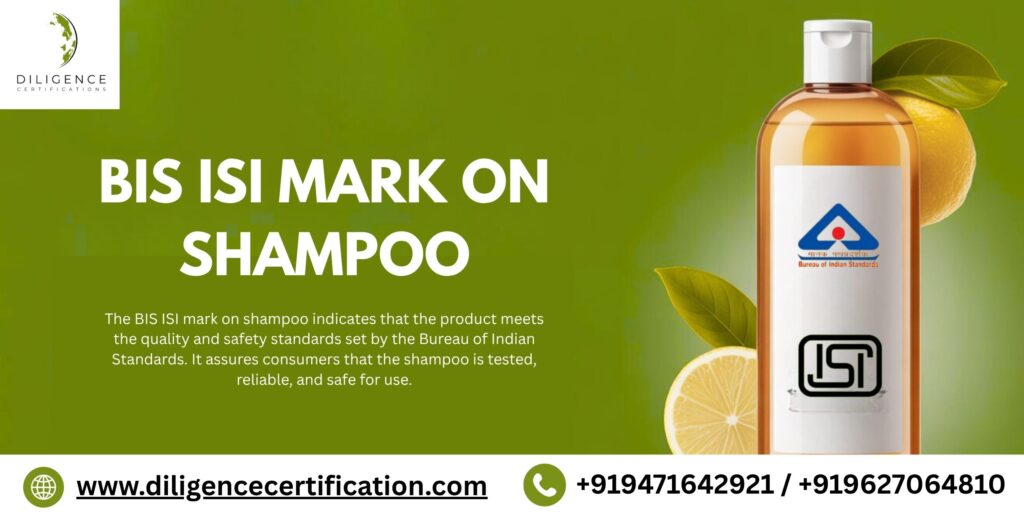- BIS requirements for shampoo safeguard consumer health while assuring product quality.
- IS 4011:2018 specifies the quality and safety requirements for shampoo products in India.
- Covers all types of shampoos (herbal, cosmetic, medicated, liquid, cream-based, etc.) meant for cleaning and conditioning hair.
- Ensures safe, effective, and reliable shampoo products that protect consumer health.
- To sell in India, manufacturers must obtain BIS certification ensuring compliance with IS 4011:2018.
Introduction
If you are producing or selling shampoo in India, neglecting the BIS requirements for shampoo can create a serious oversight and potentially leave you open to regulatory sanctions and consumer backlash. Quality compliance is not optional in today\’s FMCG environment. Founders often think launching shampoos is straightforward and uncomplicated, but the Bureau of Indian Standards (BIS) has a very robust framework to protect public health and ensure safe and effective products enter Indian consumers’ hands and homes.
One of our customers, a homegrown herbal brand, nearly lost a state tender because they neglected a trivial obligation contained in the BIS specification for shampoo. This is how critically important these certifications are! Whether a D2C entrepreneur or publishing an everyday private label shampoo for a contract manufacturer, understanding the BIS certification for sharps is vitally important to confidently operate and grow without fear of incurring sanctions.
What Exactly Are BIS Requirements for Shampoo?

The Bureau of Indian Standards sets the technical specifications for all shampoos sold in India. The specifications for IS 4011 include ingredient specifications, pH level, microbial safety, packaging and labelling. The basic intention is to protect public health and maintain equity in the Indian marketplace. If you miss these checks, your product could be seized, or banned, etc.
Key take a ways for BIS requirements for shampoo:
- Define the permissible surfactants, preservatives, etc.
- Minimum cleansing performance standards are set.
- Microbial safety and toxin-free composition are enforced.
Why BIS Certification for Shampoo Is Crucial in India?
In a market flooded with thousands of products, BIS certification acts as a trust badge. It guarantees your shampoo meets IS 4011:2018 norms, preventing substandard or even harmful products from reaching shelves.
Think about big names like Clinic Plus or Dove — their presence on government tenders is possible only because they strictly adhere to BIS requirements for shampoo. Regulatory officers will frequently pick random samples for testing. If you fail, you may face enormous penalties and product recalls.
In our experience, small brands often ignore this part, focusing more on marketing. That is a costly mistake.
Step-by-Step BIS Certification for Shampoo Process
1. Application Filing
Submit your application through the BIS portal with supporting documents — manufacturing license, test reports, brand details, and ingredient list.
2. Factory Audit
BIS officials inspect your facility, checking machinery, raw materials, and production practices. Any gaps must be fixed before moving forward.
3. Product Testing
Samples are drawn and tested as per IS 4011:2018. Third-party labs approved by BIS will check parameters like pH, surfactant efficacy, microbial counts, and packaging.
4. Grant of License
If tests pass, you’ll receive the BIS certification along with permission to use the ISI mark on your shampoo bottles.
5. Surveillance
Every year, BIS may conduct surprise inspections and fresh testing. Failure to comply results in license suspension.

BIS Requirements for Shampoo Packaging and Labelling
A crucial area many brands overlook is labelling and packaging. The IS 4011:2018 standard specifies:
- Ingredient declaration in descending order
- Batch number, date of manufacture, expiry
- Storage conditions
- Net volume in clear font
- BIS certification mark (ISI mark) with license number
If any of these are missing, you may be penalized. One of our consulting clients failed a tender bid last year because they wrote an incorrect manufacturing date format — a tiny detail, but disastrous for compliance
How BIS Protects Consumers Through Shampoo Standards
The BIS requirements for shampoo are not red tape — they are vital for consumer health. Shampoos are used on the scalp, a highly absorbent area. If your formula contains unsafe levels of chemicals, it can cause allergies or even systemic toxicity.
Through rigorous microbial tests and pH controls, BIS ensures shampoos are safe for daily use. This also protects honest brands against unfair competition from cheap, harmful imports.
Costs Involved in BIS Certification for Shampoo
Most MSMEs want to know about costs. Broadly, the investment goes into:
Application Fee – One-time submission fee for applying to BIS.
Product Testing Fee – Charges for testing shampoo samples in BIS-recognized laboratories (includes tests for pH, foam, toxicity, microbiological safety, etc.).
Inspection Fee – If required, BIS officials may conduct a factory inspection to verify production facilities and quality controls.
Report Upload Fee – Small charge for uploading laboratory reports and documents on the BIS portal.
Annual License Fee – Paid to maintain the certification and use the BIS Standard Mark.
Surveillance / Audit Fee – Periodic charges for sample collection, testing, and verification during surveillance audits.
Renewal Fee – For extending the certification validity, including partial re-testing and documentation review.
BIS Certification Requirements for Shampoo
| Category | Details |
|---|---|
| Product Name | Shampoo (Cosmetic Product) |
| Applicable BIS Standard | IS 4011:2018 – Methods of test for safety evaluation of shampoo |
| Certification Type | ISI Mark Certification (Mandatory for cosmetics) |
| Regulating Authority | Bureau of Indian Standards (BIS) |
| Mandatory/Voluntary | Mandatory under Schedule of Drugs and Cosmetics Act, 1940 |
| Covered under Schedule S | Yes (as per CDSCO) |
| Test Parameters | – pH level – Foam height – Surface tension – Eye irritation test – Heavy metal content (lead, arsenic, mercury) |
| Lab Testing Requirement | BIS-recognized laboratory with scope for IS 4011 |
| Labelling Requirement | Must comply with Legal Metrology Rules and BIS standards. Include: – Name of the product – Manufacturer details – Batch No. – Net content – Manufacturing & expiry date – ISI mark |
| Documents Required | – Company registration – Manufacturing license (from State FDA) – Test report from BIS approved lab – Product artwork/label – Authorized signatory ID proof |
| Sample Requirement | Yes, sample to be submitted for BIS testing |
| Factory Inspection | Yes, BIS officials inspect production facility before certification |
| Timeline for Certification | Approx. 30–45 working days (after successful inspection and testing) |
| Validity of Certification | 1 year (renewable annually upon compliance) |
| Applicable Industry | Cosmetic & Personal Care Products |
| Renewal Process | Submit updated documents, fee, and latest test reports |
| Penalty for Non-compliance | Fine, product recall, or legal action as per BIS & Drug Control guidelines |
Common Mistakes During BIS Shampoo Certification
Application Submission
To implement the BIS certification for your shampoo, your first step is to upload your application for the BIS certification for shampoo to the official BIS website. You would also need to upload all your supporting documents, which include, your manufacturing license, list of ingredients, brand information, and most recent product test reports, in accordance with the BIS specification for shampoo.
Factory Inspection conducted by the Bureau of Indian Standards
The Bureau of Indian Standards will undertake a full audit of your manufacturing facility. Officials will assess equipment, hygiene practices, source of raw materials, and compliance with quality controls. You must correct any non-conformities before you can proceed to the next step.
Product Testing against BIS specification for shampoo
Samples of your shampoo will be taken during the audit, and sent to BIS laboratories for testing. Samples will then be subjected to testing under IS 4011:2018, which is the BIS specification for shampoo. The aims of the test and Bureau of Indian standards specification test is to evaluate pH balance, surfactant performance, acceptable levels of microbes for cosmetics, and integrity of packaging
Grant of BIS Certification for Shampoo
Once the test results are determined, you may be granted authorization for a Bureau of Indian Standards license if the shampoo complies with all of the relevant statutory requirements. Additionally, a BIS certificate will allow you to legally use the ISI mark on your shampoo products, indicating conformity to the BIS specification for shampoos.
Ongoing Surveillance from the Bureau of Indian Standards
Even after certification, the Bureau of Indian Standards conducts ongoing surveillance through periodic inspections and unannounced inspections. Testing of your shampoos will be conducted yearly to ensure ongoing compliance with the Bureau of Indian standards (BIS) certification for shampoos. If any major breaches to the standards are discovered, you may risk having your license suspended or cancelled.
One of our clients, a premium ayurvedic shampoo startup, launched with a beautiful brand story but forgot to test for microbial contamination. A random inspection revealed E. coli counts above limits, and they had to recall thousands of bottles. That ₹10,000 test they skipped cost them ₹15 lakh in returns and destroyed their Amazon ratings overnight.
How BIS Aligns with International Shampoo Standards
Many clients ask — are Indian standards world-class? The answer is yes. Bureau of Indian standards (BIS) IS 4011:2018 is on par with European Cosmetic Regulations for microbial and pH safety. India’s BIS standards also echo ASEAN guidelines for surfactants and preservatives.
This means a shampoo certified under BIS requirements can often pass overseas audits with minimal tweaking, giving you global growth potential.
BIS certification is a passport to both Indian and global markets.
How to Renew BIS Certification for Shampoo
BIS certification is not permanent. You must renew:
- Every year
- After major formula changes
- If you change manufacturing locations
Typically, you file a renewal with fresh product test reports and allow a new factory audit if required. Renewal is cheaper than a new application, but missing deadlines can get you blacklisted.
Conclusion: Confidently Meet BIS Requirements for Shampoo
Understanding the BIS requirements for shampoo should be the foundation of any brand that is reliable, safe, and designed for growth. Regardless of what you are selling – herbal formulations, salon-quality shampoos – the Bureau of Indian Standards expects you to comply with the safety and quality requirements. You should not view the regulations as a simple checklist – they are an investment in trust from consumers and the integrity of the product, as well as the reputation you are starting to build in the future.
The specification for shampoo (as defined in BIS 4318) delineates essential elements of formulation, labelling, and performance, so that products will satisfy regulatory and consumer expectations. You should know that to comply with BIS clearly demonstrates your brand’s commitment to quality, and also expands your brands potential for sustainability in a very competitive personal care market.
If you would like help navigating the process of obtaining the BIS certification for your shampoo. Our team at R& D Lab Consulting can help you as we have expert knowledge to ensure your product meets the regulations of the Bureau of Indian Standards. Doing so will protect your company or personal brand from potential legal ramifications, and provide further credibility in the marketplace.
Frequently Asked Questions
Does shampoo require BIS certification in India?
Any shampoo produced or sold in India must comply with the standards set out in IS 4011.
Do herbal or ayurvedic shampoos require BIS?
All shampoos, herbal and synthetic must comply with microbial and pH safety standards.
What is IS 4011 for shampoo?
IS 4011 is the Indian Standard for ensuring the safety of shampoo. It sets limits for pH, inclusions, labelling, and microbial limits.
How long is BIS certification?
Usually 3 months, and rarely – up to 6 months – depending on the results of product tests and timeline to conduct a factory audit.
What if shampoo fails BIS testing?
You CANNOT sell or distribute the product lawfully, and you may also incur a fine, or have the product confiscated.
Is the BIS costly for MSMEs?
Absolutely not, costs are low in comparison to penalties and brand damages, if you elect to skip it.
Who is able to assist with BIS certification for a shampoo?
You should consult with consultants or agencies with reletive experience with the BIS certification, who would be able to assist you with filing and filing the samples for testing.
Are imported shampoos able to be sold without BIS?
No, all imports must meet the requirements of BIS in India and show an ISI mark.
How is compliance with the BIS maintained once approval is granted?
Annually to renew the license, random inspections and lab testing are done frequently at reasonable intervals.
Where can I read about BIS standards for shampoo?
You can visit BIS.gov.in to view IS 4011 standards.








 BIS Certification
BIS Certification
 CDSCO
CDSCO
 CPCB
CPCB
 LMPC
LMPC
 WPC Approval
WPC Approval
 Global Approvals
Global Approvals
 TEC
TEC
 ARAI
ARAI
 BEE
BEE
 ISO Certification
ISO Certification
 DGCA Certification
DGCA Certification
 NOC For Steel
NOC For Steel



















 Business Registration
Business Registration















 Legal Services
Legal Services
 Trademark Registration
Trademark Registration
 Copyright Registration
Copyright Registration
 Patent Registration
Patent Registration

















































